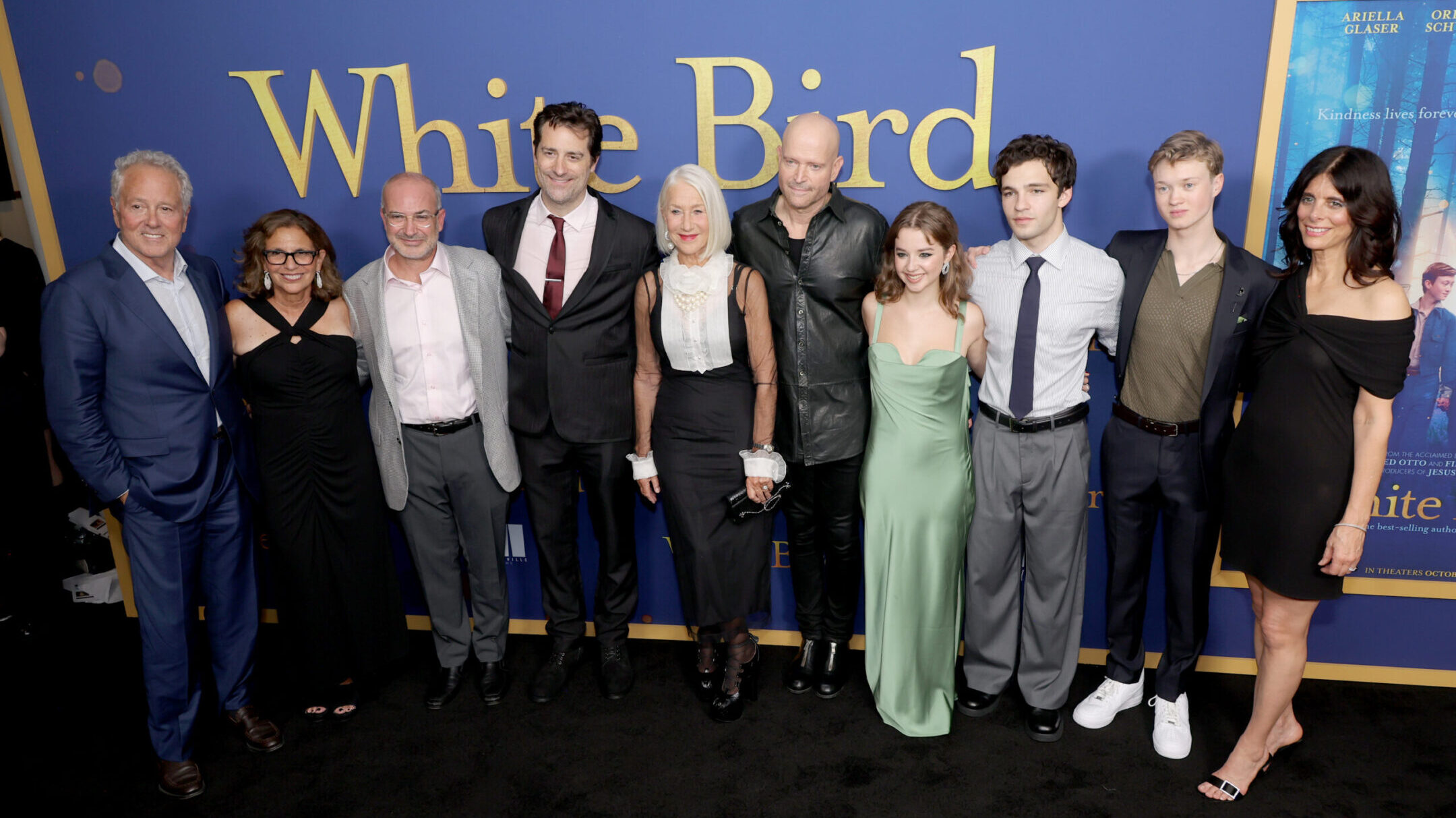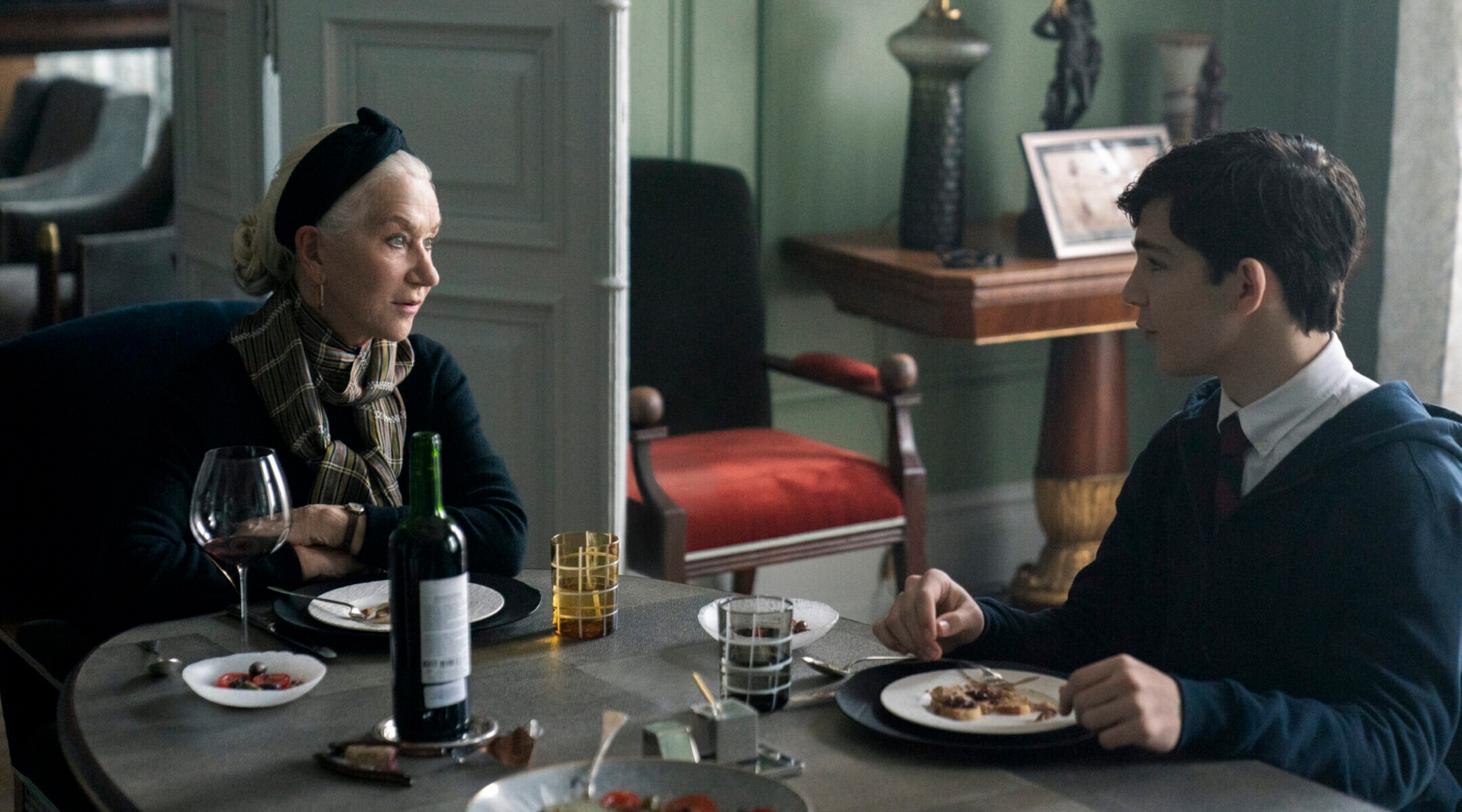(JTA) — In “White Bird,” a long anticipated film about a Jewish girl who is rescued by her classmate in Nazi-occupied France, the Holocaust is fertile ground for teaching children how to be good.
The movie is a spinoff of “Wonder” (2017), a modern-day story about a middle schooler seeking to fit in despite his facial differences. “White Bird” opens with that boy’s bully, Julian (Bryce Gheisar), but the real hero is his grandmother Sara (played in the present day by Helen Mirren and as a child by Ariella Glaser) — who, recognizing that her grandson needs moral guidance, shares her Holocaust survival story that makes up the bulk of the film.
Directed by Marc Forster, the German-Swiss filmmaker behind “A Man Called Otto,” “Finding Neverland” and “Cristopher Robin,” “White Bird” opens in theaters on Friday. It was previously slated for release in 2022 and late 2023 but was delayed because of changes at its production and distribution companies and the SAG strike last year.
Distributor Lionsgate may have found the film difficult to market, according to Deadline, as it turned to the faith-based Kingdom Story Company to help find an audience — even though “White Bird” does not resemble the label’s other faith-based films, which include “Jesus Revolution.”
Both “White Bird” and “Wonder” are based on a best-selling series by R.J. Palacio, a children’s book author with a strong interest in the Holocaust. Palacio’s husband is Jewish, and her mother-in-law lost much of her family in the Holocaust. Palacio says it was her husband’s uncle Bernard, a New York City school principal for many years, who told her about a dearth of children’s books on the subject — especially before eighth or ninth grade, when “The Diary of Anne Frank” would be assigned.
Though Palacio is not Jewish herself, she felt a duty to fill what she saw as a gap in reading about the Holocaust for younger children. Bernard encouraged her to write “White Bird,” a graphic novel targeted at readers between 8 and 12.
“Reminding people about the Holocaust and learning from lessons of the past should not be something that’s left to Jewish people alone,” Palacio told the Jewish Telegraphic Agency. “Having a Jewish husband also just kicked that into high-gear for me — and having two sons who share this heritage as well.”

The creators and cast of “White Bird” appear together at its New York City premiere, Sept. 26, 2024. Author R.J. Palacio is second from left. (Michael Loccisano/WireImage)
She was inspired by Martin Gilbert’s “The Righteous,” a book dedicated to non-Jews who risked their lives to help Jews during World War II. The influence is clear in Palacio’s story: When German troops occupy Sara’s French village, another student named Julien (Orlando Schwerdt) — bullied at school because he has lost the use of one leg to polio — helps her hide in his family’s barn, aided by his selfless parents, for over a year.
Julien’s altruism contrasts with the opportunistic cruelty of Vincent, a classmate who was attractive to Sara before the Nazis marched into their village and he rushed to help them. “White Bird” delves into the greatest charm and the greatest danger of children — their malleability.
“This is an emotional but also a very inspiring time in a person’s life,” said Palacio. “When they’re 10 to 13, they are kind of exploring who they are, who they want to be, trying on their different personalities. They’re making little moral choices all the time.”
The moral poles represented by Julien and Vincent are as digestible for Sara’s grandson as they are for viewers of “White Bird.” The lessons contained in their story — primarily the importance of empathy, tolerance and integrity — are made simpler by the medium of Holocaust fiction. In the vast turmoil of World War II, many rescuers acted out of altruism, neighborliness and love. Others were motivated by money and abandoned Jews when the money ran out. There were selfish people who made one choice to save a life, and generous people who made one choice to look away. But in a fiction about children with clearly outlined principles, it is easier to find the moral takeaway.
“White Bird” joins a new wave of efforts to make learning about the Holocaust more accessible for relatively young children, including an exhibit about Danes who saved Jews from the Nazis at the Museum of Jewish Heritage in New York that says it is for children 8 and up. Advocates of this approach to Holocaust material argue that children have too long been hammered over the head with shocking atrocities, and younger children especially are more receptive to stories about fairness and hope — which they can more readily parallel to experiences in their own lives.
“White Bird” punishes Vincent with a Grimm fairytale-style demise, involving wolves who pounce in the forest while he chases after Sara. It’s the most dramatic incident of storybook imagery that traces the children’s fantasies in “White Bird,” which also includes imagined trips to Paris and New York from the confines of Sara’s hiding place. Forster, who translated the fantastical episodes from Palacio’s book into film, said the story’s emotional authenticity allowed him to play with magical realism.
“When you tell a story with magical realism, at the beginning the key is to really find the foundation in realism,” Forster told JTA. “You feel that the story is real, the characters are grounded, the world is grounded — once you have established that connection, the characters can take you into their imagination.”
Although Vincent does not get redemption, Julian does. The recent bully, named for Sara’s rescuer, is a changed person after learning about how his grandmother was hunted down solely for her identity and saved by another outcast. He apologizes to a classmate he treated rudely at the start of the film and even joins his school’s social justice group.
“I really thought it was important that kids who saw themselves in Julian — who might be bullies themselves — understand that their paths are not predetermined, and one bad mistake doesn’t define you,” said Palacio. “Everyone has a chance to start again.”
JTA has documented Jewish history in real-time for over a century. Keep our journalism strong by joining us in supporting independent, award-winning reporting.






